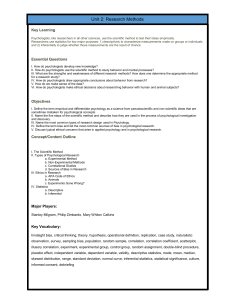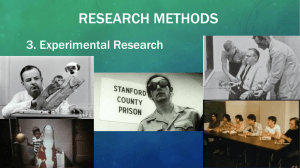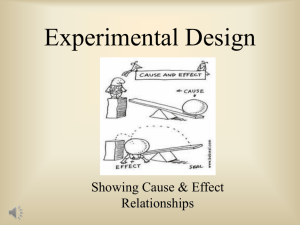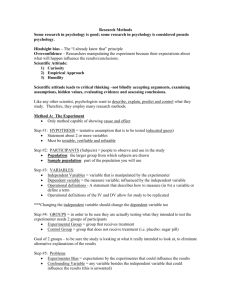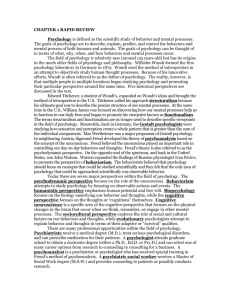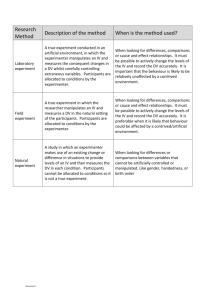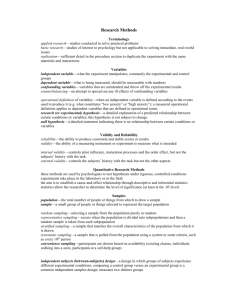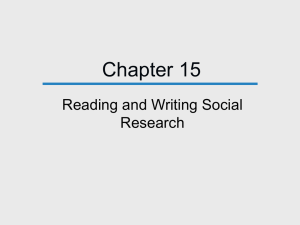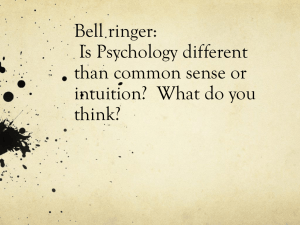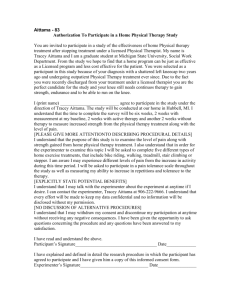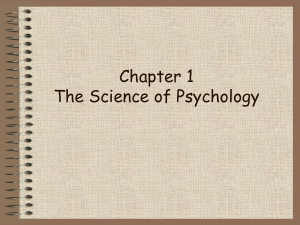Practice MC Questions
advertisement
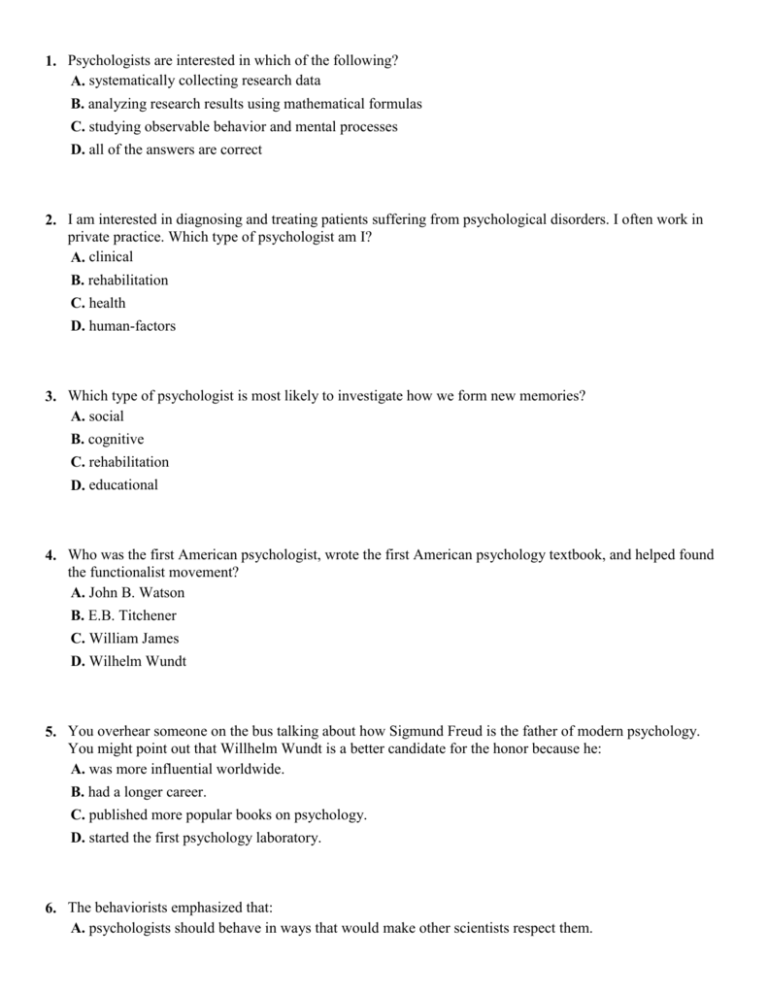
1. Psychologists are interested in which of the following? A. systematically collecting research data B. analyzing research results using mathematical formulas C. studying observable behavior and mental processes D. all of the answers are correct 2. I am interested in diagnosing and treating patients suffering from psychological disorders. I often work in private practice. Which type of psychologist am I? A. clinical B. rehabilitation C. health D. human-factors 3. Which type of psychologist is most likely to investigate how we form new memories? A. social B. cognitive C. rehabilitation D. educational 4. Who was the first American psychologist, wrote the first American psychology textbook, and helped found the functionalist movement? A. John B. Watson B. E.B. Titchener C. William James D. Wilhelm Wundt 5. You overhear someone on the bus talking about how Sigmund Freud is the father of modern psychology. You might point out that Willhelm Wundt is a better candidate for the honor because he: A. was more influential worldwide. B. had a longer career. C. published more popular books on psychology. D. started the first psychology laboratory. 6. The behaviorists emphasized that: A. psychologists should behave in ways that would make other scientists respect them. B. human behavior needs to be understood in the context of our thoughts and feelings. C. psychology should focus exclusively on studying observable behaviors. D. psychology should focus exclusively on studying nonobservable behaviors, like thinking. 7. Which modern psychological perspective focuses on how healthy people strive to reach their full potential? A. humanistic B. behavioral C. psychodynamic D. cognitive 8. Psychologists who focus on understanding unconscious drives and conflicts in explaining human behavior are called: A. behaviorists. B. humanists. C. psychoanalysts. D. functionalists. 9. Which modern psychological approach focuses on understanding how people think, process, store, and retrieve information? A. humanism B. social-cultural C. cognitive D. biological 10. Dr. Wilson attributes the actions of criminal gang members to the cultural norms and role expectations associated with gang membership. Her belief best illustrates a _____ perspective? A. psychoanalytic B. social-cultural C. neuroscience D. cognitive 11. The tendency for research participants to behave in certain ways because they know what the researcher is looking for is called: A. confirmation bias. B. hindsight bias. C. participant bias. D. belief bias. 12. Participant bias occurs: A. in every experiment because everyone has a bias. B. when participants decide to disrupt the experiment due to a dislike of the experimenter. C. when participants respond differently because they know they are being observed. D. when you only examine a certain sample group instead of investigating everyone in a population. 13. Dr. Beins believes that studying under cold conditions will decrease memory ability. His participants are asked to study a list of 15 unrelated nouns for 1 minute while sitting in a room with a temperature of 40 degrees. To reduce participant bias, Dr. Beins should: A. have a fellow researcher administer and record the results of the memory test. B. be sure to maintain a 40-degree temperature for all participants. C. give all the participants the same list of nouns and the same time to study the list. D. not tell the participants what he expects to occur until after the study is over. 14. Cross-sectional studies: A. compare individuals from different age groups at one time. B. compare individuals from different ethnic groups at one time. C. primarily examine gender differences. D. study the same group of people over a long period. 15. In a research study, the term “population” refers to: A. all of the researchers in a given field of study. B. the group of participant volunteers that shows up on the day of the experiment. C. the group of people the researcher draws his sample from. D. the specific group of participants the researcher chooses to work with. 16. The independent variable in an experiment is: A. the effect of random chance on the results. B. the most important variable the experimenter could not control or take into account. C. the variable the experimenter manipulates in order to examine its effect on the dependent variable. D. the variable the experimenter measures in order to see if it was affected by the change in the dependent variable. 17. If psychologists discovered that wealthy people are less satisfied with their marriages than poor people are, this would indicate that wealth and marital satisfaction are: A. causally related. B. dependent variables. C. independent variables. D. negatively correlated. 18. The right to debriefing is especially important if: A. the research study was not screened by an ethics committee beforehand. B. the study included any deception. C. the researcher plans on publishing the results. D. no informed consent was given. 19. Researchers and members of the research team are not allowed to gossip or spread information about research participants. Which ethical guideline protects this right? A. informed consent B. protection from harm and discomfort C. confidentiality D. debriefing 20. Dr. White wanted to test if hypnotized participants, with one arm in an ice water bath, would still be able to signal if they were in pain. Which of the ethical guidelines should Dr. White be especially concerned with? A. confidentiality B. debriefing C. protection from harm and discomfort D. all of the answers are correct.
